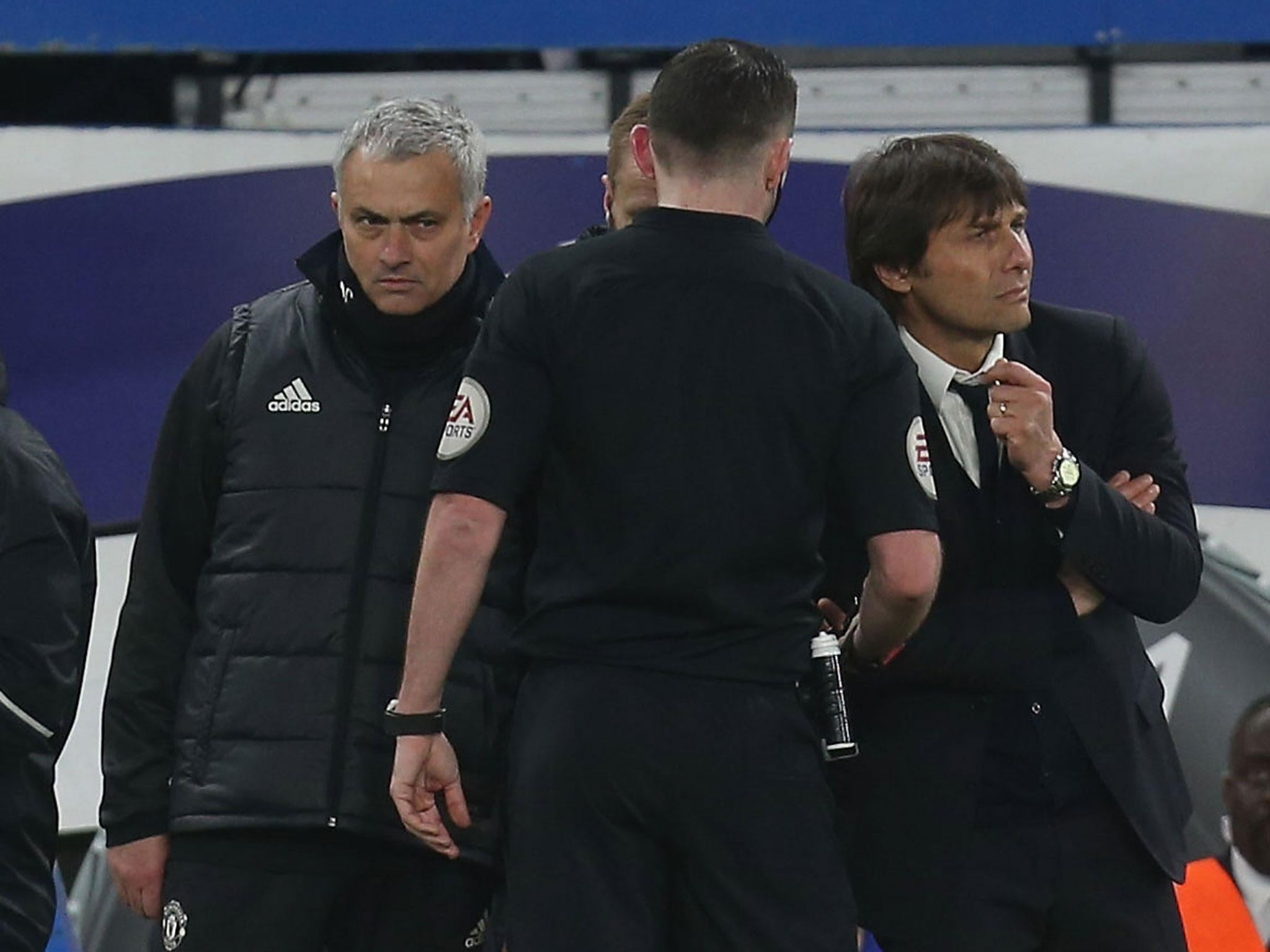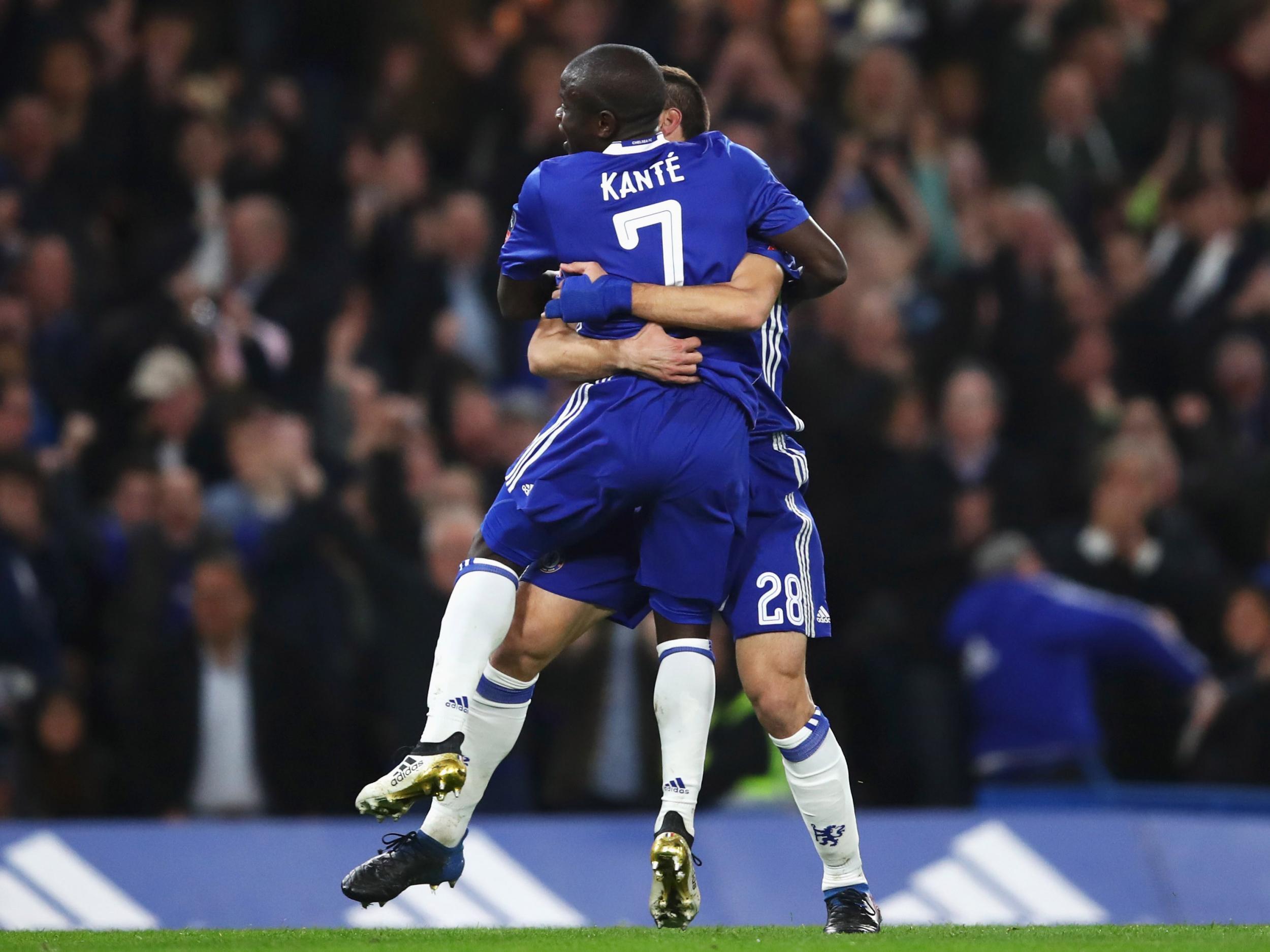Both managers saw it differently - but could Jose Mourinho and Manchester United have done more?
Chelsea's win over United was a game of what ifs and it's impossible to escape the conclusion that Mourinho reverted to type a little too easily, writes Miguel Delaney

Your support helps us to tell the story
From reproductive rights to climate change to Big Tech, The Independent is on the ground when the story is developing. Whether it's investigating the financials of Elon Musk's pro-Trump PAC or producing our latest documentary, 'The A Word', which shines a light on the American women fighting for reproductive rights, we know how important it is to parse out the facts from the messaging.
At such a critical moment in US history, we need reporters on the ground. Your donation allows us to keep sending journalists to speak to both sides of the story.
The Independent is trusted by Americans across the entire political spectrum. And unlike many other quality news outlets, we choose not to lock Americans out of our reporting and analysis with paywalls. We believe quality journalism should be available to everyone, paid for by those who can afford it.
Your support makes all the difference.After an FA Cup tie that ended with such a difference between the sides in terms of second-half performance, there was still a huge difference of opinion between the managers.
Jose Mourinho claimed Manchester United’s gameplan in the first 30 minutes of their sixth-round match at Chelsea worked, and that he had “the feeling" his side would win - until what he evidently perceived was as an unfair red card for Ander Herrera. Antonio Conte did not see it like that. He believed United’s whole gameplan was to “kick” Eden Hazard, with one possible inference from that that a red card was inevitable when you play a game so based on impeding an attacker.
In the wide open space between such contrasting viewpoints, there are a few more specific questions that can fairly be asked.
One, who was right - who did start better? Two, was Herrera’s red card genuinely as unwarranted as Mourinho made out? Three, did United respond to that dismissal as well as they could have.
As Mourinho himself said, it’s down to “perspective”, but worth teasing out.
The Portuguese was right when he said that the way United’s forwards pressed Chelsea’s three centre-halves disrupted Conte’s game.
“Our strategy was to play with two up front,” Mourinho argued. “When we had two up front, the three central defenders couldn't come with the ball. They were giving bad long balls, outside the pitch.”
He was only right, however, to an extent. It was only two United players doing this, while the rest seemed primarily concerned with either stopping the ball getting to Hazard or just stopping Hazard, especially Phil Jones. How else to explain a formation with four centre-halves, and two effective wing-backs? It just about told in the chances and pattern of play before the red card. While United had one opportunity from a ball up to Marcus Rashford that ended with a Henrikh Mkhitaryan shot just wide, Chelsea seemed more capable of creating flurries, as they did with one impressive spell around the 17th minute sparked by a Hazard run.
It would be completely fair to say that the game was generally well balanced, however, and it would have been engaging to see how it would have developed had both kept 11 men on the pitch.
That didn’t happen. Chelsea got the breaks that have gone their way this season, in a way you could say haven't for United. Every campaign will be conditioned by base luck to an extent that is often underappreciated, even if you should obviously do your best to try and minimise its effects.
That was maybe what Herrera didn't do here, as Michael Oliver felt he was deserving of a second yellow card. The Spanish midfielder did seem to rather snidely impede Hazard for his first, and this may have influenced the referee’s mind for the next, not to mention the fact that he had told Chris Smalling to get the United players to cut out the fouling. That Herrera's next foul came so quickly after this was conspicuous, and he could have played it a little more smartly. Hazard did perhaps use this to his advantage by going down easily, but Herrera also went in strongly.
The key is that both yellows were generally understandable if not necessarily cast-iron. That would usually make it harsh to criticise Oliver for them… except for the fact that there were so many inconsistencies to his decision-making.
This was where United and Mourinho were right to be aggrieved, as the manager made clear.

“Compare Herrera's second yellow card with that of a couple of minutes later when Rashford goes to attack the space and the Chelsea captain grabs him, stops him in a counter-attack. Mr Oliver does not give a card, not even a yellow. But I'm not talking about that.”
Mourinho was willing to talk about how the game transformed at this point, but this is perhaps where the most criticism could be offered. One red card, after all, need not be a death sentence even if it will skew things. It felt rather too reactionary and submissive to take off United’s most creative player, Henrikh Mkhitaryan, for their most destructive in Marouane Fellaini.
It ensured that they could only play one way. Was there nothing else that could have been done? Could he have maybe switched to three at the back, or else used Mkhitaryan or Juan Mata as a shuttling presence between attack and defence as, say, Glenn Hoddle did with Alan Shearer in England’s epic penalty shoot-out defeat to Argentina in the 1998 World Cup? There were also plenty of examples of his predecessor Sir Alex Ferguson still being willing to go for it when United were a man down, not least in the famous 1999 FA Cup semi-final against Arsenal, when their main midfielder - Roy Keane - was dismissed. This was surely an occasion for Paul Pogba to step up, too, to bridge that gap in the team with his athleticism and ability; to offer that statement over-performance in a big game that we haven't yet seen from him for United. He did not. That's not to criticise him for failing to do so in difficult circumstances but you can say it was a wasted opportunity. One of those displays really does have to come at some stage to stave off criticism and justify that talent.
Similarly, the point here is not to criticise Mourinho for losing a game when they went to 10. It is whether he could have done a bit more.
It was impossible to escape the conclusion that he reverted to type a little too easily, and just defensively retreated. There are plenty of caveats to that, of course. United were without attacking options such as Zlatan Ibrahimovic and have a much more important game in the Europa League on Thursday. No point in exhausting themselves for that.
Caveats, however, should not be excuses. It just felt like United offered very little, other than that one Rashford chance, that was probably the best in the game.
It is quite a thought experiment to wonder how the match would have panned out had he scored that to make it 1-1, as he should have, but then that’s the case with this entire occasion. A cup tie of what-ifs.
How they would have panned out depends on perspective.
Both managers had very different perspectives.
Join our commenting forum
Join thought-provoking conversations, follow other Independent readers and see their replies
Comments